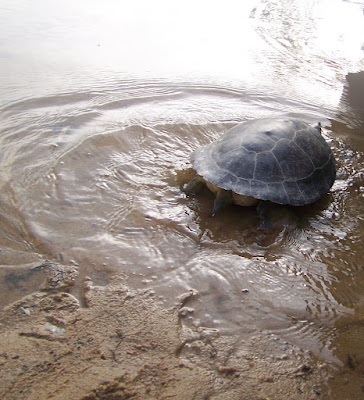One of the things I do here is collect data on turtles captured accidentally by fishermen in the Setiu river. TCC has an arrangement with Ropi, a young local fisherman, who notifies other fishermen of when we would like to measure turtles. Then, any turtles that they catch, they bring to Ropi and he keeps them until we can come take their measurements. TCC pays him and the fishermen who catch the turtles a little something for their help, and we get mark-recapture data that helps us understand how the population is doing.

|
Measuring carapace width |
Yesterday we went to Setiu to measure terrapins for the second time since I arrived. Each terrapin gets weighed on a scale, has its carapace (top shell) length and width measured with calipers, and gets scanned to determine whether it has a microchip ID tag (if we have already caught it previously). We also inject microchips into any turtle caught for the first time and cut small notches in the edge of its shell that allow us to identify the turtle without a scanner.

|
With Pelf and a river terrapin |
It struck me again yesterday how cool it is that Pelf and I ended up working together before we even knew that we had both spent time at the Wetlands Institute, she as a visiting Asian Scholar in 2008, and I as an intern in 2007. Even though we were not there in the same year, it has meant that we have a set of common experiences, friends, and research skills right off the bat, and I could not be more grateful!

|
Weighing a little one |
As I first discovered during my time at the Wetlands Institute, it is really quite fun to get to hold the turtles and measure them. Wrangling may be a bit over-dramatic as a descriptor, but the bigger ones especially can be quite tricky to work with. Their legs and necks are very strong as they try to flip themselves off the scale and they employ their sharp claws and wide feet to scrape annoying human hands off their shells.
Perhaps I am sentimental and anthropomorphizing too much, but I am sure the turtles do not particularly enjoy being weighed and measured and marked, so I try to remember to wish them good luck when I let them back into the river, and thank them for their contribution to science and the conservation of their species. If nothing else, it is a reminder to me of who I am really working for here, and the responsibility that we all have to help take care of creatures on the brink of extinction. I hope they understand, and I do hope and believe that the suffering they endure is worth it in the end. Each turtle who withstands the abuses of research is another reason that I want our conservation work to succeed.
Along those lines, I wrote this poem.
What must they think of us?
The subtle click and tap
of claws on sterile glass
and calipers on carapace
are seemingly but backdrop to
the tidy swish-and-kiss of Pen on Notebook Page
where Patterns murmur in the swelling queues
that wait to join some Noble and Eternal Grid.
And yet,
dramatic tales of each new notch-ed number
on a shell
would be told for generations
if any but the Pen were free to tell.
---
Finally, it is not often that one sees the practice of science depicted at all, much less artistically, so here is a contribution to the realm of Science in Art. This photo was taken by Pelf and edited by me.

|
I know, being in black and white does not automatically make it "art." I was interested in the mix of organic and geometric textures and shapes, so I ditched the colors. |





















